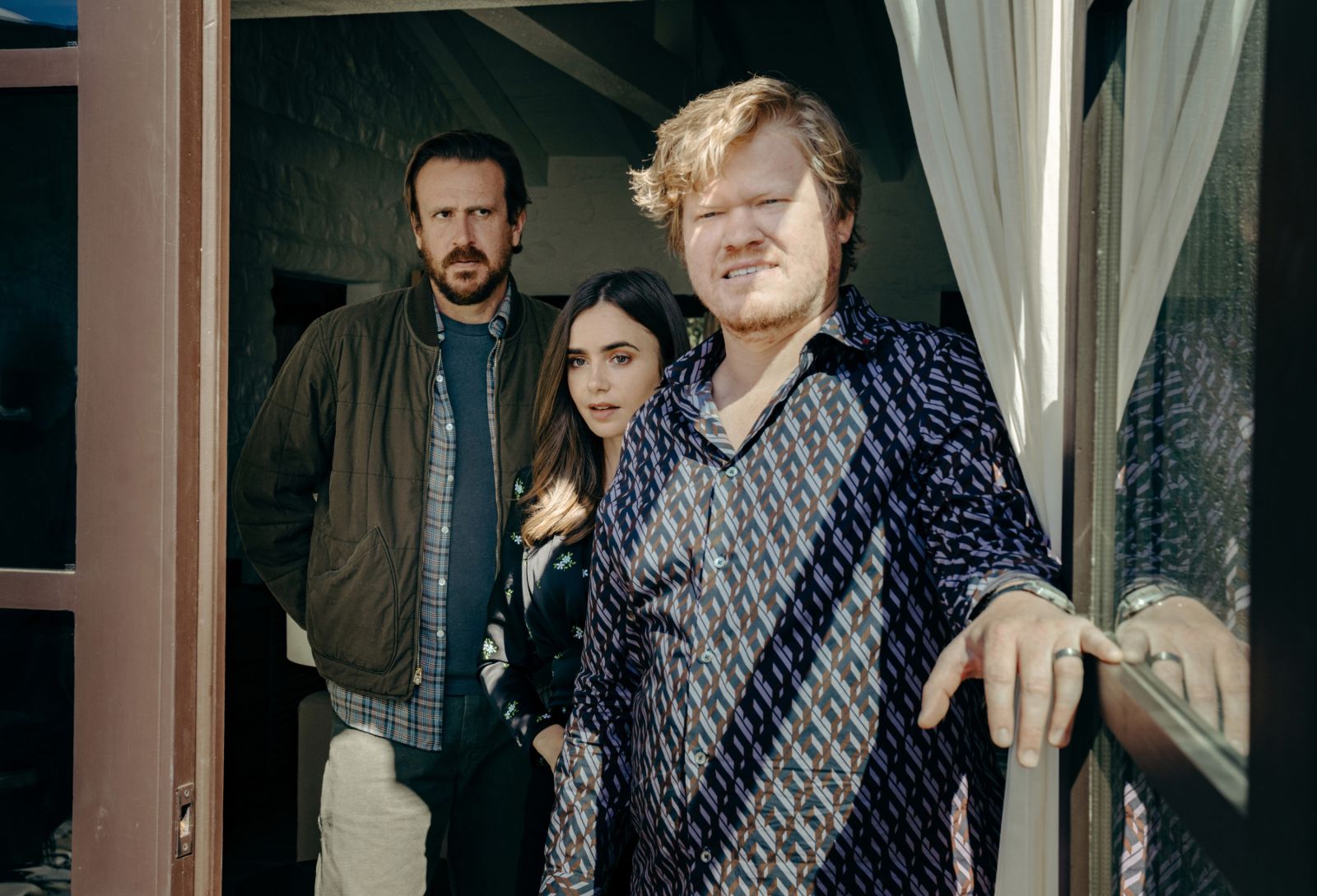From the old school ‘50s-era opening titles, you can feel what tone Charlie McDowell’s Windfall is going for. The director’s third feature plays up the Hitchcock aesthetic big time in its marketing, but tonally it feels even more adjacent to Rian Johnson’s bouncy recent works of mystery thrills, The Brothers Bloom and, especially, Knives Out. A three-hander confined to a single location, the film stars Jesse Plemons and Lily Collins as a tech CEO and his wife heading to their vacation home in Ojai, only to find Jason Segel’s character in the middle of robbing it. Knowing that his identity is blown thanks to a hidden camera he spots, Segel demands enough cash to be able to start a new life, and the unnamed trio enter into a tense period of waiting for the money delivery to be arranged.
It’s a quick and easy set-up for a film, a design utilized by writers Justin Lader and Andrew Kevin Walker (who hatched the story with McDowell and Segel) to build this tale out from the location as the starting point. Making the film during the pandemic offered them the opportunity to get creative with telling this insular tale, though surely McDowell’s experience with a similarly enclosed shoot on his first feature, The One I Love (shot about a mile away from the Windfall house), aided in him knowing how to use the design of the film to elevate it.
The script takes some exciting, subversive turns that shift one’s understanding of what this film is from time to time, but it’s really the craft of Windfall that stands out the most. The striking production design by Andrew Clark, combined with meticulous blocking, framing, and lighting by cinematographer Isiah Donté Lee gives the film a distinctive visual panache. That holds true as well for the springy score by Danny Bensi and Saunder Jurriaans, which leans heavily into that vintage caper aesthetic. There’s a lot that feels familiar about Windfall, particularly with its premise we’ve seen before—most notably in 1994’s The Ref, which pitched acerbic thief Denis Leary up against bickering yuppies Judy Davis and Kevin Spacey––but the design choices from top to bottom help establish a sense of originality.
Segel and McDowell have built up quite a collaborative relationship at this point, having worked together on several short films, an episode of Segel’s AMC series Dispatches from Elsewhere, and most notably 2017’s underrated existential afterlife drama The Discovery. Their partnership has been a great fit as Segel has forged new ground in his oeuvre over the past decade, branching into dramatic roles and fascinating projects.
The casting of all three leads is intriguing for different reasons, but it’s Segel who makes the most lasting impression, channeling the rage of his worn-out everyman trying to take something back. There’s a sadness to him, and a shift that occurs the moment Plemons and Collins arrive where you can tell in his eyes and the way he holds his body that he knows this isn’t going to end well for him. From the second they saw him, he was screwed, and now he’s just staving off the inevitable. Yet perhaps he always was. Maybe that’s why he was there to begin with. The script leaves his backstory rather ambiguous, a welcome choice that suits the character’s wisely guarded nature and lack of desire to reveal details about himself to his captives.
Plemons positively eats up this performance, taking on a boisterous, detestable tech CEO whose egotism runs so rampant that he can’t help but get further under Segel’s skin even as the man has a gun to his head. One of our best working actors, it’s a treat to see the newly-anointed Oscar nominee let loose without ever stepping over the line past believability. This is, sadly, a man we all know in a way, whose whining about how we’re living in “a world of lazy loafers and free-loaders” who “spend all their time bitching and moaning” leads directly into his treatise on the plight of the rich white guy in today’s society. It’s not a particularly layered role, but he makes it come alive. As his wife, Collins is given the far more complex turn, a woman who clearly hates her husband and has a lot of regret about the life she’s chosen to lead. Unfortunately, the script lets her down by not engaging enough with this aspect of the character, and Collins’ performance falls a bit flat as a result.
Windfall uses the dynamic between the three leads to probe into themes of class hierarchy and gender roles, but something about those explorations feels undercooked. There’s a sense of this being more of a first draft of a stronger picture, one that could have built out those concepts into something more substantive, as opposed to merely scratching the surface.
Nevertheless, it’s an entertaining watch, with plenty of peculiar touches, such as very early on when Segel demands $150,000 in order for him to leave and Plemons and Collins end up talking him up into demanding more, because surely he needs $500,000 instead to realistically start a new life. It’s moments like these, with this strange cordiality between the characters, that makes Windfall a bit more of a distinctive time than you might expect, but its svelte 90 minutes feel too low-stakes to land much resonance once it’s over––especially after a final act that takes a few unconvincing narrative directions.
Windfall is streaming on Netflix now.

